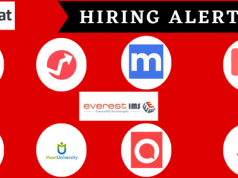Joining Google is on every job seekers wish list. Ever wondered why people who have these dream jobs give it up? Check out what some of these Google employees have to say about their experience –
Adrian Carballo, a software engineer who worked at Google recounts his experience.
I worked at Google for a little over a year, and there were many reasons why I decided to leave. I was a software engineer working mainly on web development, which means JavaScript, HTML and CSS. If you look at the meteoric rise of JavaScript in particular, it’s clear to see that JS would be nothing without the support of the open source community. Yet, at Google all these tools are used in a very specific way to fit the needs of the applications that are built internally. You can’t really use tools from the outside worldbecause it wouldn’t work with the build system that is used internally. Forget about things like npm, or bower. Forget about nodejs. Forget about using something that is not g-built.
So instead of using something like jQuery or Ember, React etc your only options areGoogle Closure (!) or more recently Angular. Instead of SASS you would use GSS, even githas an internal equivalent called git5. The deal is that these tools change rapidly. Nowadays React is the new hotness, but tomorrow it could be something else. Forget about experimenting and being able to play with these tools. You’re locked in.
There is an initiative to bridge this gap with the outside world, and so people sometimes do bring tools from the outside and get it to work with the internal build system, but then nobody updates those dependencies as they evolve, and it’s just a nightmare.
On top of this, at least in the bay area the cost of living is insane, and if you work off of the MTV campus there isn’t even that much to do other than working or hanging out with your coworkers. Lame. You do have free food available all the time, and many cafes, gyms, laundry rooms, etc. but over time as you start using all these perks (because it’s just too convenient) you spend more and more of your time at the office. You start making the same choices day in and day out. You hang out more and more with the same people you work with. People who you may not even like, but what the hell, it’s free food!
I ended up deciding it was time to move on to more freedom. Freedom to do different things, with different tools, hang out with different people and eat different types of food at different places, even if I have to pay for it.
An ex-Google employee who wishes to stay anonymous says –
The most frustrating thing at Google for me is that everything moves at a very slow speed.
After working in Google for some time, you’ll have much less to show to potential employers compared to a small company. If you’re a good engineer who’s thriving on getting things done and releasing them to people, you might be disappointed. Getting anything done at Google is a major effort, due to the amount of accumulated code and various rules that have to be satisfied before you can release.
In my small team, one person was constantly busy with maintaining production configuration files and switching parts of the code to some new internal technology. That person moved on, of course. He had the same experience in his previous team.
I worked at Google for a few years and was in some projects which were cancelled before completion. Those projects took a sizable amount of time. Let’s just say that they didn’t “fail fast”. In the end I practically had to leave a well paid job with mostly very capable colleagues, because I didn’t want to gamble with the chance of being on another failed project. I assumed getting that kind of experience hurts my career options.
I’ve since joined a good startup and have accomplished more for the company, in a much shorter time.
Piaw Na, ex-employee, Google shares,
The most frustrating thing about working at Google is that everything has to scale at launch. You have no opportunity and no room for experiment. Here’s an example: Facebook launched first at Harvard and then slowly grew one university or three at a time before opening to the public. Orkut had no such luxury. As a result, Orkut had scalability problems almost from day one. Many products are held back for such work, and that’s ok if the product turns out to be incredibly popular, but is frustrating if it ends up being a flop and all that extra work was for nothing and you could have “failed fast” and be on another iteration if you were at an independent startup instead of working for a behemoth like Google.
(The answers were originally shared by respondents on Quora for the question – what is the worst part about working with Google?)


























